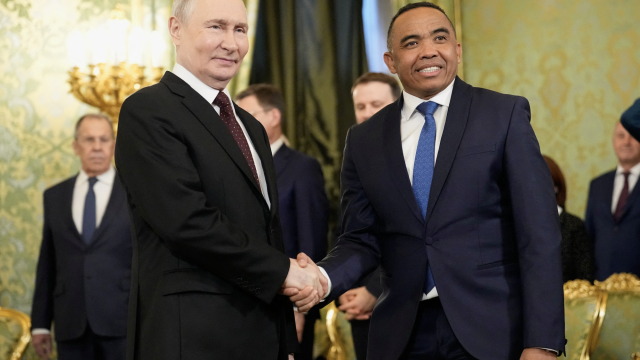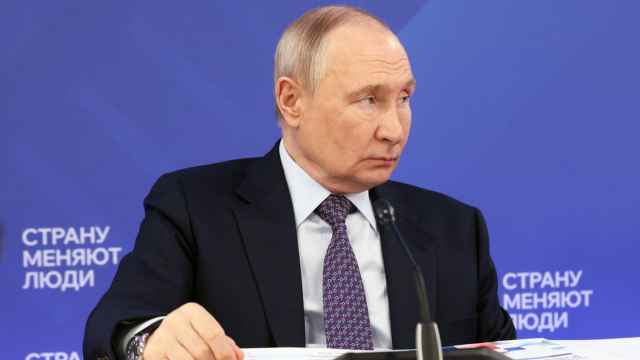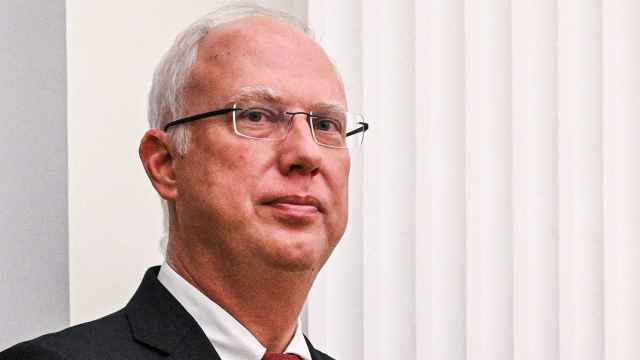The achievements of the information technology and telecommunications sector in 2013 highlight the paradox of the government's efforts to wean the economy from its reliance on natural resources while maximizing control of how the virtual world functions.
The turnover of "Internet dependent markets" — an ecosystem that includes Internet service providers, investments in Internet companies and electronic commerce, reached 4.3 trillion rubles ($131 billion) in 2013, equivalent to 6.9 percent of the country's gross domestic product last year.
"Research and practical experience indicate that the Russian Internet has become a promising platform for building successful businesses," said Sergei Plugotarenko, president of the Russian Association for Electronic Communications, during a forum in Moscow summing up the country's Internet achievements last week.
Meanwhile, the government continues to increase its scrutiny of how the web is used and managed, both at home and abroad. The parliament reviewed 35 pieces of legislation related to the Internet in 2013, compared to 31 last year. Last week, Foreign Minister Sergei Lavrov followed up on efforts by Russia this summer to increase sovereign control of the web, when he reaffirmed the state's determination to push the United Nations to create an international organization to control the Internet, Interfax reported.
Virtual Evolution
Some government officials are already contemplating how the sector will evolve.
Deputy Communications and Mass Media Minister Alexei Volin said Internet development is inseparable from economic development and now is the time to think about the next segments of the economy that will become dependent on the Internet 3 to 5 years down the road.
Education and health services are the most likely new candidates to benefit from Internet technologies and digitalization in the next few years, Volin said.
Last month, Prime Minister Dmitry Medvedev signed the 2014 to 2020 information technology development strategy identifying "the development of information technologies as one of the most important factors" to fulfill President Vladimir Putin's post-election orders to increase worker productivity by 1.5 times by 2018, help five Russian universities to enter the top 100 in the world by 2020 and raise salary levels 50 percent by 2018.
The strategy's goal is to decrease the economy's dependence on natural resource export by increasing export of information technology products and services to $11 billion by 2020, up from this year's $4 billion.
Keeping Control
Although officials at the forum recognized the resilience of the Internet dependent economy to effects of a global and domestic slowdown, parliamentarians have been busy passing amendments and creating new laws to gain more control of the sector.
Last week, human rights activists and members of the political opposition expressed their concerns about the State Duma passing the first reading of a bill allowing prosecutors to block websites containing illegal information, including invitations to public protests and "extremist" activity, without getting a court order.
In July this year, President Vladimir Putin signed an anti-piracy law allowing courts to order the blocking or deletion of web pages containing pirated video content based on a request by copyright holders. This would be done using an IP blocking mechanism that could inhibit legitimate content residing on the same servers.
Ruslan Gattarov, a member of the Federation Council's information policy committee, said at last week's forum that the Communications and Press Ministry has moved from a phase of "hopping from one issue to another to a systematic problem-solving approach." This resulted in laws and regulations that, he said, are welcomed by the industry.
"It obvious that the government is keen to sort out the legal framework because of the growing social and political importance of information technology," a statement from the Russian Association for Electronic Communications said.
"We hope that the country's authorities … in the near future are able to realize the necessity to change the model of Internet management from vertical to horizontal, and start to regularly and actively involve experts from the Internet industry, scientists and community representatives in developing legal initiatives," the statement said.
| Telecom and IT Highlights of 2013 and the Shape of Things to Come… | |||
| Feature | 2013 Highlights | Key Moments and Players | What's Ahead for 2014 and Beyond |
| Market
Overview | The size of the "Internet dependent markets" of the economy is $131 billion, including content, services and e-commerce market of $17 billion, and electronic payments market of $8.2 billion. | Top investments into e-commerce firms in 2013:
Lamoda.ru — $130 million Ostrovok.ru — $25 million Holodilnik.ru — $12 million Oktogo.ru — $11 million | Crisis scenario: 3 to 6 percent annual market growth.
Conservative scenario: 6 to 10 percent annual market growth. Innovation scenario: 35 to 40 percent annual market growth. |
| Internet
Penetration | 66 million people — 57 percent of the country's adult population — go online on a monthly basis, out of whom 52.1 million use the Internet daily, according to Public Opinion Foundation and East-West Digital News report.
Average annual growth in Internet penetration is 10 percent. | Leading websites, in order of popularity:
Vkontakte.ru Odnoklassniki.ru Yandex.ru Mail.ru Avito.ru Largest residential Internet service providers by market share (AC&M data): Rostelecom: 38.6% ER-Telecom: 11.1% VimpelCom: 10.1% MTS: 9.4% TTK: 4.6% AKADO: 3.3% Others: 22.9% | At the current growth rate, Russia's Internet penetration could reach 75 percent by 2020. |
| E-Commerce | The e-commerce market reached $16 billion (about two percent of the total retail market).
There are about 39,000 online retailers (up from 32,500 in 2012), of which less than 30 made more than $100 million in sales, according to East-West Digital News report. | Top e-retailers: Ozon.ru, Otto group, Wikimart, Yandex.Market, Lamoda, Enter.ru | The online retail market could reach $27 billion by the end of 2014.
It is expected there will be 44 million online shoppers by 2015, up 100% from 2012. |
| Software | Export of software products and development services exceeded $5 billion. | Russia's leading software makers in the global top 100, according to Global Services rating and RUSSOFT:
Artezio, Auriga, DataArt, EPAM Systems, FirstLineSoftware, Luxoft, MERA, Reksoft. | The domestic software market and export volumes will grow 10 to 15 percent, according to industry association RUSSOFT. |
| Mobile
Communications | There were just more than 239 million SIM cards in use by the end of 2013, which is equal to 168 percent of the population, according to market research group AC&M.
Mobile Number Portability (MNP) went into effect Dec. 1, but will not be enforced until April 15, 2014. The government's plan to end national mobile roaming fees by 2018 was scrapped in August. | Regulator: Communications and Press Ministry, headed by Minister Nikolai Nikiforov
Leading cell phone firms and their total number of subscribers (third quarter 2013): MTS: 73.1 million MegaFon: 66.3 million VimpelCom: 58.1million Tele 2 Russia: 3.6 million Rostelecom: 14 million | About 12 percent of mobile users, or about 28 million people, plan to take advantage of the possibility provided by the MNP law to switch to a different provider, a survey conducted by the research group Romir in August 2013 said. |
| Legal Framework | The number of bills dealing with the Internet increased from 31 in 2012 to 35 in 2013.
There are more than twice as many bills that are viewed negatively rather than positively by the Internet industry (69 percent and 31 percent respectively), according to the Russian Association for Electronic Communications. Foreign Minister Sergei Lavrov reiterated the country's desire to have the UN create an international organization to control the Internet last week, Interfax reported. | The Communications and Press Ministry and its watchdog Roscomnadzor,
The Education and Science Ministry, The Finance Ministry, The State Duma. | The government will continue adopting more measures to regulate the Internet, the Russian Association for Electronic Communications said.
The key focus areas will be resource blocking by IP address, protection of personal data, intellectual property, cloud technologies and electronic payments. The Finance Ministry on Monday called for a reduction of the tax free import threshold that allows shoppers to buy goods online and get them delivered from overseas without any duties, from 1000 euros ($1368) to 150 euros. |
| Major Corporate Developments | Qiwi, an instant payment operator went public in May, raising $213 million in an offering on Nasdaq. Software development company Luxoft raised $69.6 million in an IPO on the New York Stock Exchange in June.
In April, Swedish mobile provider Tele2 sold its Russian assets to VTB Group for $2.4 billion. In October, VTB sold 50 percent of Tele 2 Russia to several strategic investors including Bank Rossia and Russian businessmen Yury Kovalchuk and Alexei Mordashov. In December, state-owned Rostelecom merged its mobile assets with Tele 2 to create a new company to compete with the "big three" leaders on the Russian market. Mobile phone retailer Svyaznoi started selling SIM cards under the Svyaznoi Mobile brand in November, becoming a new mobile virtual network operator, or MVNO, using MTS infrastructure. Interregional Transit Telecom said in December that it plans to launch an MVNO in April 2014 targeting migrant workers, offering low cost calls to Central Asian countries. | ||
| — MT | |||
Contact the author at [email protected]
A Message from The Moscow Times:
Dear readers,
We are facing unprecedented challenges. Russia's Prosecutor General's Office has designated The Moscow Times as an "undesirable" organization, criminalizing our work and putting our staff at risk of prosecution. This follows our earlier unjust labeling as a "foreign agent."
These actions are direct attempts to silence independent journalism in Russia. The authorities claim our work "discredits the decisions of the Russian leadership." We see things differently: we strive to provide accurate, unbiased reporting on Russia.
We, the journalists of The Moscow Times, refuse to be silenced. But to continue our work, we need your help.
Your support, no matter how small, makes a world of difference. If you can, please support us monthly starting from just $2. It's quick to set up, and every contribution makes a significant impact.
By supporting The Moscow Times, you're defending open, independent journalism in the face of repression. Thank you for standing with us.
Remind me later.






